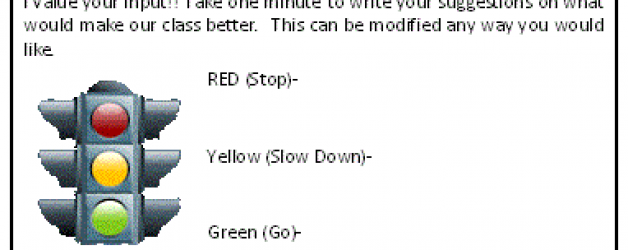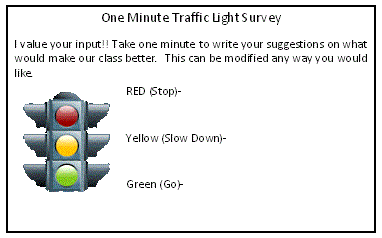
by Lisa Rombes, Mathematics

How is this class working for my students?
Do you ever wonder what your students really think of the class you have designed, or whether they’re connecting with your teaching style? Do you want some feedback that is focused on the success of the students, not on the evaluation of the instructor (you)?
I wanted such feedback in Math 125. Math 125 is a ‘terminal’ math class (less ‘you need to know this for the next class;’ more ‘here is some math that you might actually use’).
Many students have math anxiety, and many have put this class off until the end of their WCC career. I want to allay their fears, and do everything I can to help them complete the class successfully, no matter their background or what their level of math confidence is. I find the more information I have about their experience of the class, the better I can support them. So, I have experimented with an addition to our regular SOQ process: Midterm Student Feedback.
How do I ask for feedback, without eliciting less-than-productive answers?
One example of the type of feedback I desire: do they WANT me to post an announcement in my online class every week that says what is due that week, even if it is pretty much the same assignments, different modules, every week? Read on for the answer that my students shared with me on that particular point.
How did I work in this activity as a required, graded part of the class?
Math 125 has multiple sections: face-to-face, online, and blended. Students already use online homework from the publisher of our book. To increase the “WCC Experience” and engagement between students and faculty, we have constructed our own additional “Quests,” in which students apply what they are learning. These are built into the blackboard Master course for all face-to-face, online, & blended sections. They are about 20% of the grade in the class, so by midterm the students have worked this into their weekly routine. Participation on this clearly non-math Quest is very high.
What does a Quest like this look like?
The activity consists of a Blackboard essay test with the following questions, which were inspired by a Linked-In post I read while prepping for fall one year. These are the questions I ask:
- You are taking Math 125, which we call “Everyday College Math”. Have you learned something so far that you feel will be helpful in your everyday life? Explain what it is, and why it is important.
- How is the structure of the class you chose (online, blended, face to face) working for you?
- What advice would you give a student who is going to take this class next term?
- What is one thing your instructor should KEEP DOING to help students be successful?
- What is something your instructor should START DOING to help you be more successful?
I could not be more pleased with the results of asking these five simple questions. I get thoughtful responses. I get suggestions I can use. And I get an energy boost hearing what students want me to keep doing.
How do the questions shape answers & outcomes?
- Question 1 is customized to the curriculum in the class. I can think of ways to reword
this for any class. Two examples:
- You are taking a class in ___________. Tell me something you have learned about ___ that surprised you.
- We called the class you are taking “Portrait Photography”. How has your understanding of the word “portrait” changed?
- This first question gets to the heart of the matter: is the class fulfilling its stated purpose for the student? Most of my students answer something about finance; either home mortgages or student loans. But, I get surprised too: at least one student really liked the Venn Diagram problems we do.
- Question 2 has provided some very interesting answers.
- Some students say “I really did not want to take in online but it was the only section open.” Many then go on to say why online is not working for them. At least they have learned this lesson: maybe they will register earlier next term to be sure to get the format they want.
- Many students thank me, though, because online is letting them finish their degree with a baby at home, a full time job, military deployment, etc.
- Question 3 taps into the student’s metaknowledge about their own success.
- Wording it to be about a future theoretical student, instead of the student themselves, takes the pressure off, and turns what might currently be a negative into useful expertise going forward.
- Rather than having to say what they’ve done wrong: “I wish I had kept up starting with Module 1,” the student can help others: “I advise them to make time midweek to do the homework.”
- Questions 4 and 5 are positively worded.
- I admire instructors who walk the plank and elicit negative criticism, I suppose, but that doesn’t always lead in a productive direction. Here, I avoid answers like, “give me a passing grade,” or “make the class easier.”
- These questions cause the student to think about what instructors do to help them learn & be successful, not just focus on something outside themselves that isn’t ‘letting’ them succeed.
What have I learned from using this assessment?
A surprise to me: students do want an announcement of assignments due every week in an online class. They say it reminds them “oh, I have work to do.” I will supplement this, of course, with my usual announcements talking about common errors on Quests, common email questions, and more.
I also have learned that students very much appreciate the timely response to emails and my flexibility in working with them.
This Midterm Feedback keeps my finger on the pulse on the class. I hope it’s helpful for you, too. As you adapt it for your own courses, email your version to [email protected] & keep this conversation going!
